Psychology Memory Pdf (Part-4)
After completing short-term memory, we are moving ahead to long-term memory. Psychology Memory Pdf (Part-4), We will talk about the difference between short-term and long-term memory, and Primacy and recency effect. We will also learn about semantic coding in long-term memory, Now in the last few articles, we have been talking about memory we have talked about sensory memory we have talked about short-term memory and we have talked also about the concept of working memory.
Now the sensory memory and the short-term and the working memories are still much smaller stores are still stores that hold information for not more than a few seconds and in that sense, they are more akin to memory that comes and goes, and it kind of in a more dynamic setup but what is that aspect of memory which we refer to in the first article as providing us the sense of continuity of life that writes us the sense of being in prices the sense of that we are x y or z.
What is called long-term memory?
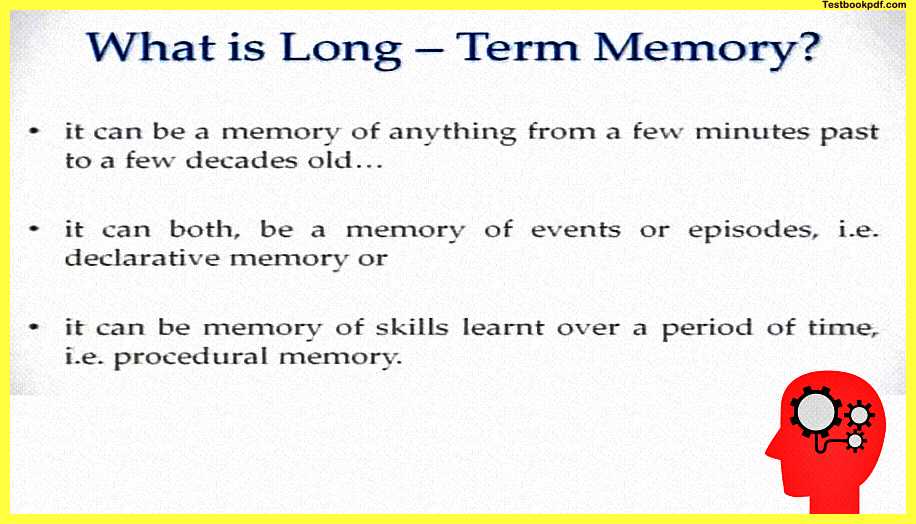
Now long-term memory can be the memory of anything from just a few minutes passed to your entire life to a few decades old anything any information that you remember from so long ago also long-term working memory can both be a memory of events your birthday when you are six years old your let us say if you got selected to a particular position or you got selected for a great college or something like that or say for example the memory of when India won the world cup in 2000 those kind of things are memories of events or memories of episodes that basically comes under what is called declarative memory.
Now long-term memory also by the way includes the horde of skills that we have learned that we pick up while growing up say for example when you first learn to ride the bicycle or a bike or a car or those kinds of things well you just learn to draw you learned to say for example even things like the way you learn to speak and those kinds of things so procedural memory basically is the memory for all the skills you have gained over a period of time so long-term memory in that sense includes everything that you can say that this is something that I know all of your knowledge is basically pretty much in your long-term memory.
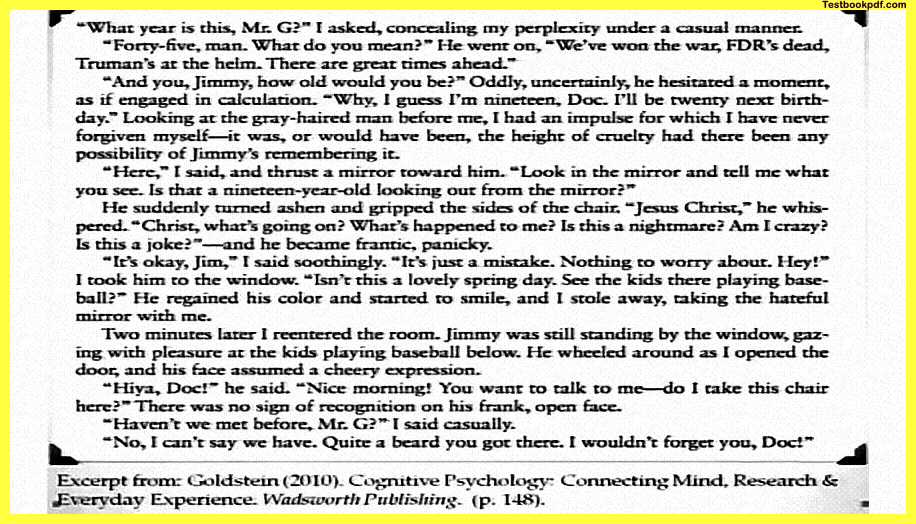
Now, what happens if say for example your long-term memory is damaged or say for example you cannot remember items for more than a very small amount of time here is an excerpt from Goldstein’s book about a conversation I think this is from Oliver sax’s book it’s basically about a conversation with the patients of amnesia from a patient of amnesia and then the author is kind of talking to this person and he basically asks him what year is this what is the time and this person basically has had amnesia since the age of nineteen it seems so it kind of the person asked him what year is this and this patient replies it is 45 and he is telling a few incidents that happened in the year 1945 and this person asks what is your age and the person and this guy replies that I am 19 years of age.
Now a lot of time has passed and this person is obviously not nineteen at the moment it’s many years later that this conversation is happening so our friend here the author who is having this conversation trusts thrust the mirror toward him it’s kind of a rude thing to do but he thrust the mirror towards you and he says he kind of regrets doing that and this patient gets really perplexed he gets really panicked at the sight of himself in the mirror and he has no memory since the time he was nineteen to the time when say for example he is 38 or 45 or whatever point in time this conversation has been happening.
Now imagine something like this happening to one of our cells how would it feel say for example if the entire chunk of life is gone and it’s absent and you cannot really remember anything about it that will be rather hard I would say another conversation with the same person say for example this guy the author here is trying to make him remember something so he kind of says he tells him that he remembers telling me about your childhood growing up in Pennsylvania working as a radio operator and those kinds of things the how your brother got engaged to a girl in California so this person remembers yes you are right but wait I did not tell you that this information that you are telling me is right but I do not have a memory of telling you all of this.
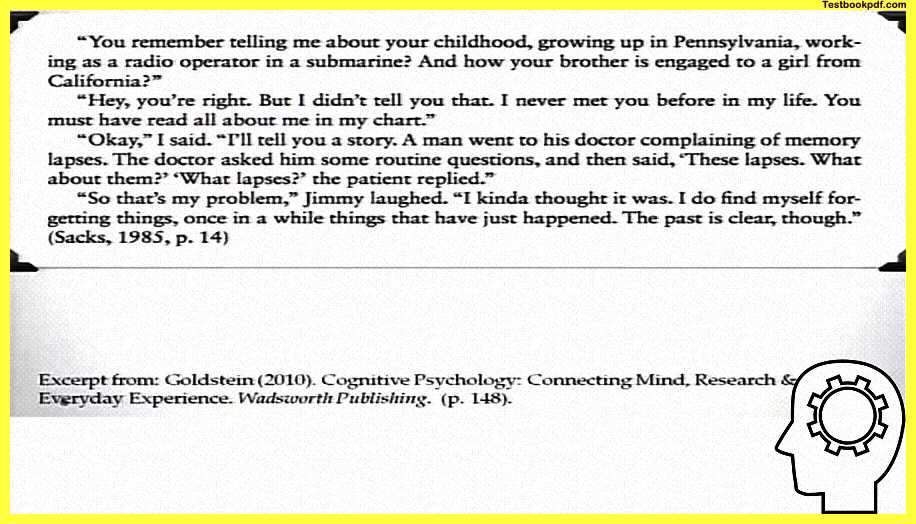
Now, this is where this person the patient gets really perplexed so the author is telling the story that a man went to his doctor complaining of memory lapses, and after he told the doctor everything and the doctor says something the patient says what kind of lapses are you talking about.
Drew Barrymore
So it might be possible that the patient or amnesia does not remember anything past a conversation and in that sense the person is living in that very short span of time probably living that short shorter span of time again again because no new memories are being formed i remember a movie i think drew Barrymore and adam Sandler appeared in this and the movie was called 51 first dates in that movie also you will find that the patient drew Barrymore or sorry probably adam Sandler suffers from a particular injury in accident and he suffers this kind of memory loss and the entire movie you will see that them reliving that whole time of the first date they had because this accident probably happened just after the first date was completed now these kind of movies and there are many movies on these kind of things you will find in Hollywood and probably in Bollywood as well but what do these informations tell us that memory is a very intrigue integral part of our lives and it is something that kind of forms the core of our existence and personalities.
What is long-term memory?
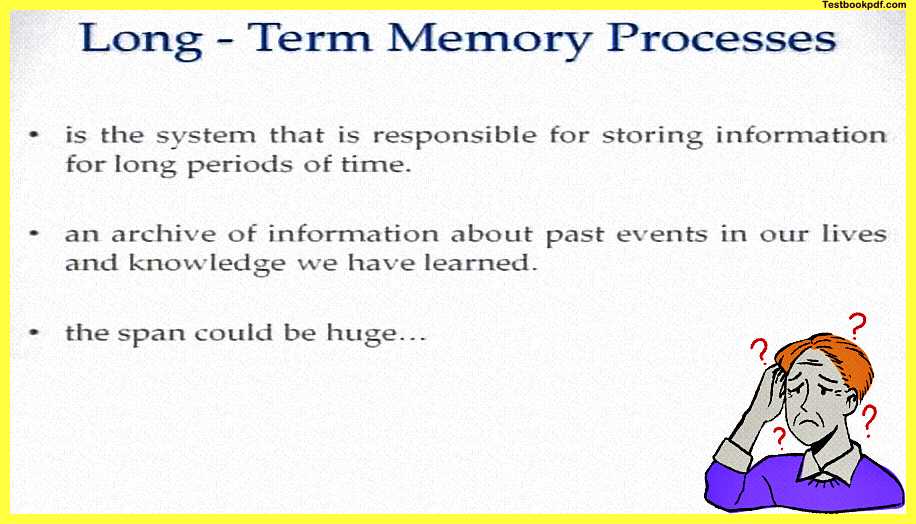
So let us now come back and try and define what long-term memory is we have been talking about what long-term memory is about so long-term memory or long-term memory processes are the processes and it is a system that is responsible for storing information for longer periods of time relevant information might not be forgotten ever but most information is stored there for a relatively longer period of time at least as compared to the short-term of working memory or sensory memory things it is supposed to be an archive of information about past events in our lives and knowledge about everything we have learned the span of long-term memory as opposed to the span of working memory or short-term memory as you have seen in the last articles can be huge it’s probably very difficult to measure what the span of a long-term memory is actually here and you can see a demonstration from goldstein’s book wherein this person is trying to remember what long-term memory is the first aspect when the person just sits down on the chair is probably still in the short-term memory maybe it is going to be there up to few seconds or maybe a minute at max but everything else since the most recent five minutes to as long as 10 years ago is all in the long-term memory.
Today in this article we will also learn about Memory, what are the processes with which we store memories we make memories in the long-term memory and what are the processes involved in taking out information from there and using it, and so on and so forth.
What is the difference between short-term and long-term memory?
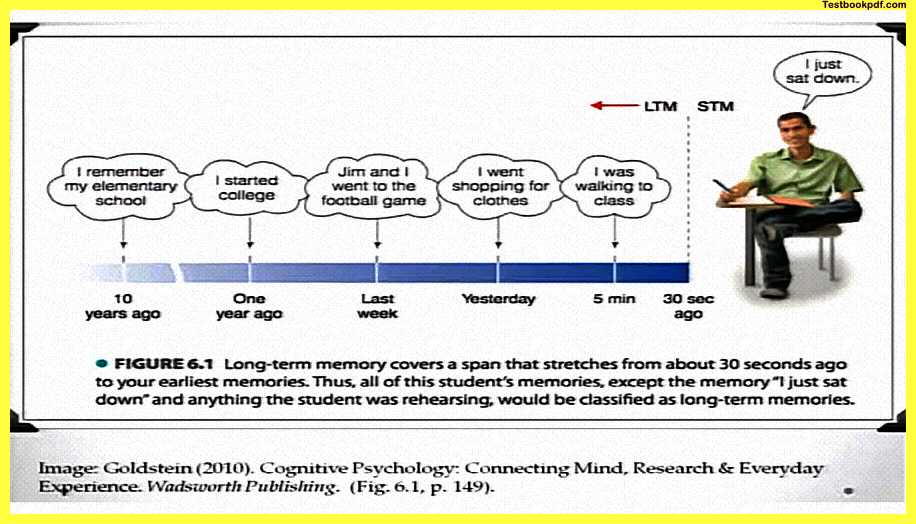
For example – you meet somebody and that person is telling you about some particular episode obviously you are talking to this person you are making some judgments but in your long-term memory, you are kind of trying to have all that information results here in this conversation there is a Cindy and tom and tony talking so Cindy tells that Jimin I went to see the first James bond movie at the short term at least the information that is being accessed or activated by tony is the fact that Cindy went to the movie with Jim but in the long-term memory and there is this interaction obviously happening all this information about what James on James bond is what that movie was about I have also seen that movie and judgments and decisions that c Cindy is probably a James bond fan and those kinds of things are all happening at the same point.
so all of that information is basically being drawn from the long-term memory it is sometimes it is obviously coming to the shorter memory when he is actively thinking about that and then going back to long-term memory so this is something which you have to really remember that whatever our common-sense conception of memory is is more basically efficiently portrayed in the concept of long-term memory any memory that we may talk about as lay persons is generally and more often than not long-term memory here is a demonstration by Murdoch in which he wanted to test the long-term memory of participants and you can also use this demonstration of on any of your friends so the idea is that there are these fifteen words here and you try and repeat these words to one of your friends at the rate of one word every two second and after that you ask this person to recall and rewrite those words or recall those words one after another in any order possible so the procedure will be termed as free recall.
Now when Murdoch did this experiment with a large number of participants and he plotted the percentage recall for each of these words against the position of the words in a particular list he obtained.
What is called a serial position curve?
So what is the serial position because here position curve looks something like this and wherein you will see that words in the first to the fifth position or basically are remembered best and then what is remembered best is the words in the most recent conditions the words say for example 18 19 28 position or first second and third positions are those that will receive the best recall you will see the words which were told first are obviously remembered better but the best or the most recalled word are those who which are said most recently?
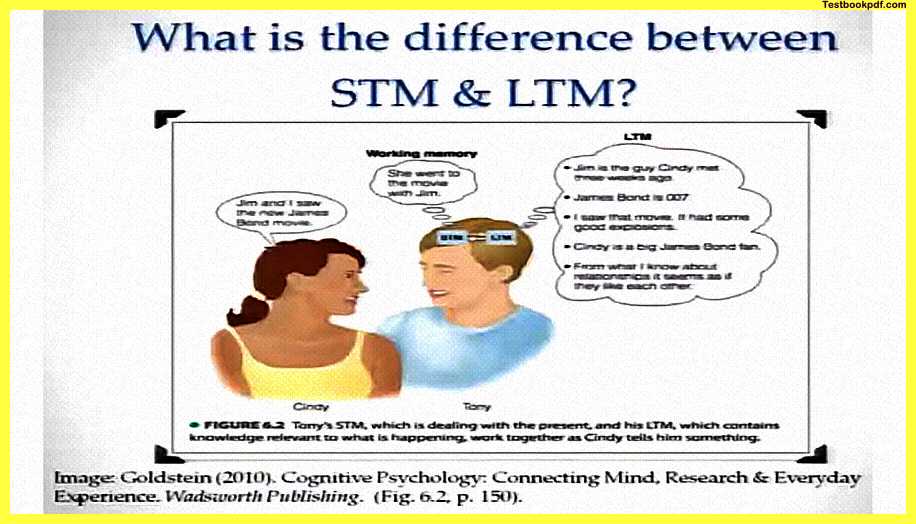
Now Murdoch’s serial position curve indicates that the memory is better for words at the beginning of the list and at the end of the list than for words in the middle of the list So if you look at this figure here the words in the middle of the list are the ones which are least remembered superior memory for stimuli presented at the beginning of the list has been termed as a phenomenon called the primacy effect a possible explanation of the primacy effect or is basically that the participants did have the time to rehearse these words in the LTM.
So when I am saying when I am starting to say these lists this list of words say for example I am starting to say let us say barricade children diet ground folio and those kinds of things as I am saying these words at the rate of one word every two seconds you have this chance because I have told you that I will ask you to recall these words later to rehearse these words you are probably also repeating these words at the same time while I am saying them in order to not forget them but when more words are added to the list your rehearsal kind of becomes lesser and lesser the words at the beginning of the list received your 100 percent attention and received the best rehearsal but the words which came after the second third fourth fifth and tenth twelfth words they receive a proportionately lesser amount of rehearsal and lesser amount of attention and that is why the recall kind of decreases steadily while you are reaching towards the middle of the list.

Now the idea for more rehearsal of words David Landis wanted to test it and he again derived a serial position word by presenting a list of 20 words at the rate of one word every five seconds giving enough time for rehearsal and then he asked his participants to just write down all of the words the serial position curve the red one here you will see basically came out pretty much the same as the curve that was gained by Murdoch.
Now run this actually he added a small twist to his experiment by asking his participant to study the list as it was being presented by repeating words out loud during the five-second interval between words so he said that while I am repeating a word every five seconds during that five seconds you repeat whatever words I have already said they were not told which specific words to repeat they could probably the participants were free to repeat whatever words they would want to here are you can see the performance the dashed curve here which you see the blue one basically indicates how many times each word was repeated and it was found that how many times the number of times each word was repeated very striking resemblance to the first half of the serial position curve so you will see this if you notice the first half of the serial position curve tells you that the words at the beginning of the list were remembered better.
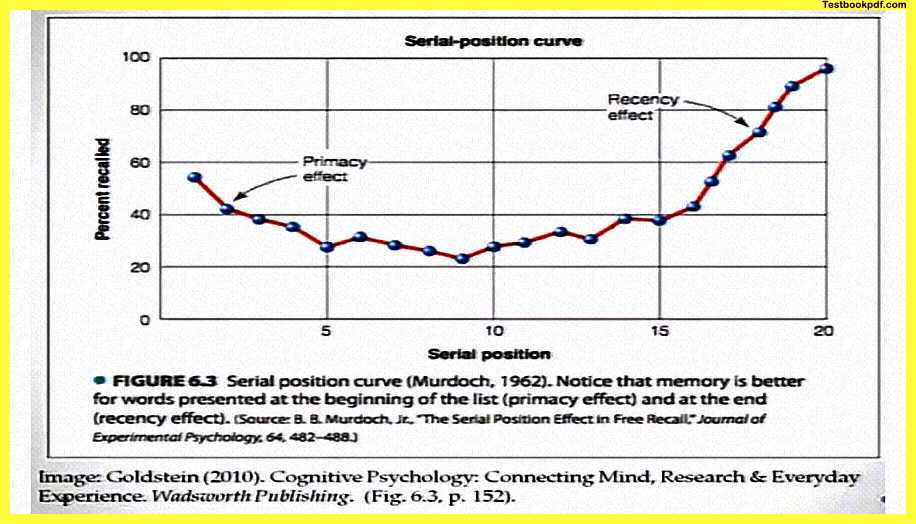
Now because that which are the words most rehearse you see that these are actually the words which were most rehearsed so the amount of rehearsal for the words at the end of the list is the lowest than the amount of rehearsal for the words at the beginning of the list is highest and in that sense, this amount of rehearsal may then very well be used as the reason to account for the primacy effect.
Now, this is how you can see that very cleverly designed experiments can tell you a lot about mental phenomena.
Now superior memory you have seen also in the same figure here that there is very good memory there is a very good recall for words at the end of the list so superior memory for items at the end of the sequence or the list is called the recency effect one possible explanation for the recency effect is that some of these items are still present in the short-term memory that is there but Glanzer and Cunitz wanted to test this idea.
So they first derived a serial position curve in a usual way and I will show you that figure very soon then what they did was in another experiment they measured the curve again after having participants count backward for 30 seconds right after hearing the last word of the list so that there was no rehearsal or no maintenance happening for these words at the end of the list discounting prevents the rehearsal and allowed time for information to be lost out of this short-term memory and then this delay caused by counting eliminated the recent effect so there is no recency effect in the curve that you see is obtained by Glance or incontinence so you see you can obviously manipulate the amount of rear cell that is gained and that amount of rehearsal is certainly going to play with the amount of recall that is going to happen.
- How do you store information in the long term?
- How do you push information to the long-term we will talk about that.
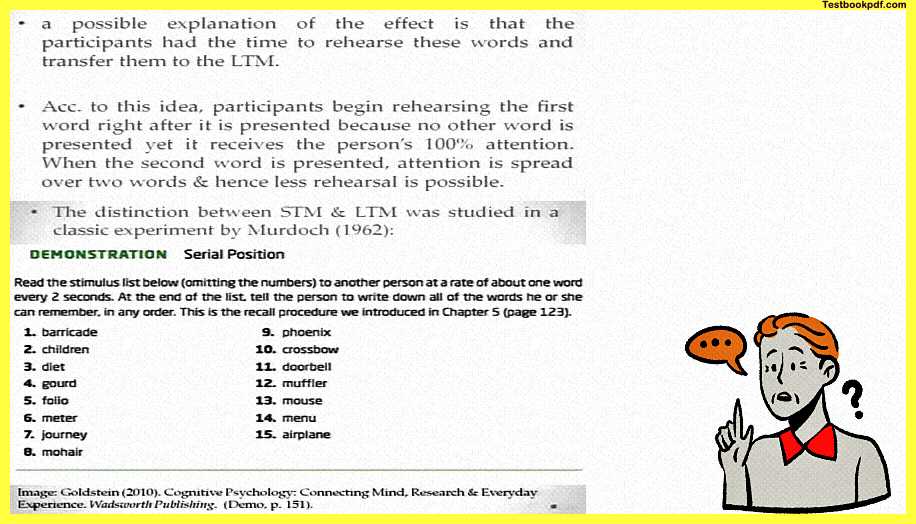
Now all three types of coding auditory coding which is by virtue of sound visual coding by virtue of visual perception and semantic coding which is by analysis of meaning can take place for the long-term memory as well but the preferred coding strategy for information the long-term memory has to be semantic coding because if you analyze the words for their meaning if you analyze how new information is related to the older knowledge that you have already had that will basically very deeply plant the new information and your recall will be better and you might be able to remember this information a relatively long time.
Now semantic coding is basically illustrated by the kind of errors that people do the kind of errors they mistake in these kinds of recall tasks which involve long-term memory say for example misreading words like a tree as bush will indicate that the person got the gist of the meaning of what the tree is but he probably did not remember the exact word kind of confusing two words which mean alike so maybe that is why you got confused between the tree and the bush.
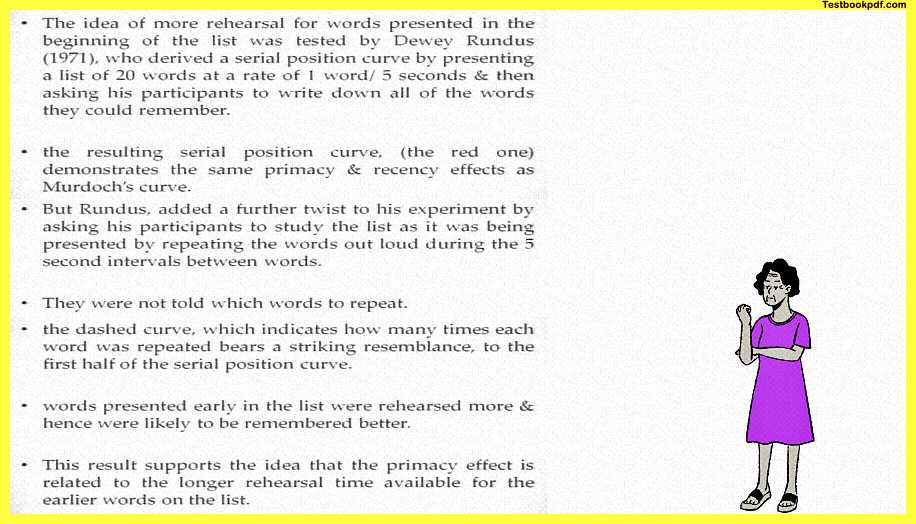
so you are not remembering the exact word but you are remembering the gist of the idea that is how semantic encoding is achieved a study by sax in 1967 demonstrated the importance of meaning in the long-term memory sacs had participants listen to a tape recording of a message and then measured their recognition memory to determine whether they remember the exact wording of the sentence in the passage or the general meaning of the passage this demonstration of or say for example when you really want to check for somebody’s long-term memory one of the ways to do that is basically testing for recognition memory recognition memory basically is just that if you have remembered a list i will give you a couple of prompts i will give you some cues and then i will basically ask you whether these two items were the items that were presented in the initial list that i asked you to memorize that is pretty much what the recognition memory is about and this is different from recall memory because recall memory i am not giving you any queue i am just asking you to remember right out of your memory whatever i had told you earlier if you have played or if you have watched say for example tv programs such as kbc you will see there is they are basically checking for the recognition memory or not really the recall memory.
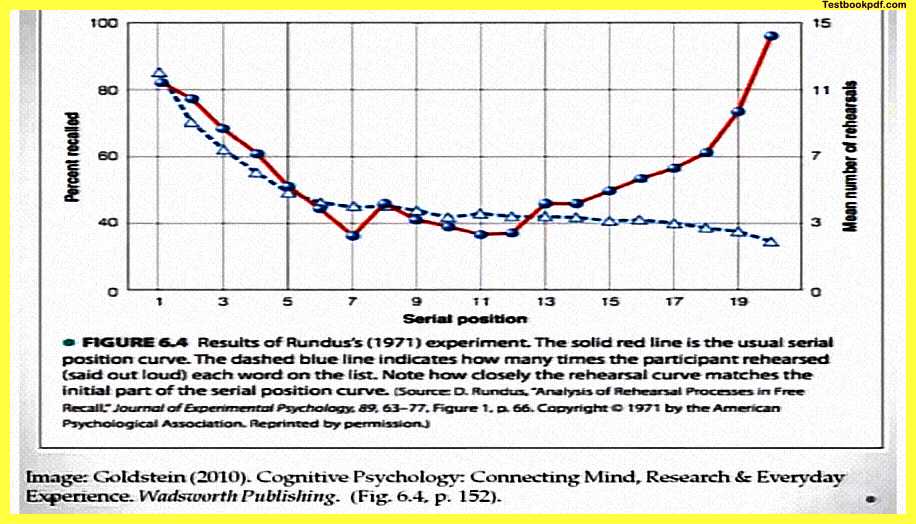
Now an experiment similar to what Saks did well I am going to tell you a story a very small story and then I will take a bit of a test in holland a man named Lipper was an eyeglass maker one day his children were playing with some lenses they discovered that things seem very close if two lenses are held about a foot apart liberty began experimenting and his spyglass attracted much attention he then sent a letter about it to the to galileo an Italian scientist galileo at once realized the importance of the discovery and set about building an instrument of his own now this was the passage now can you tell me which exact sentence indicates which in basically and how this is changed.
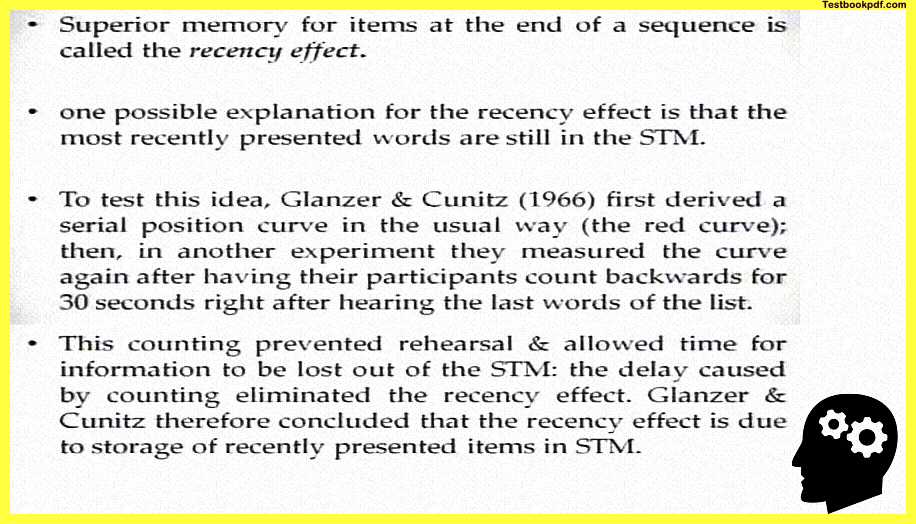
So now you have covered the passage and now basically you have to indicate which of the following sentences is identical to the sentence in the passage and which sentences are changed so he sent a letter about it to galileo that great Italian scientist galileo the great Italian scientist sent him a letter about it, a letter about it was sent to galileo the great Italian scientist and he sent galileo the great Italian scientist a letter about it.
Now which of the ones is the sentence that is exactly mentioned in the passage earlier I think this one he sent a letter about the first one is basically the correct one a lot of people kind of mix it sentences one is the only one that is identical to the one in the passage however a lot of people identified numbers three and four as the matching as matching the one on the passage even though the wording was different why are they doing this it’s just said right away one of the reasons could be that these participants are apparently remembering the gist and the sentences meaning but not it’s exact wording this is pretty much how we store information in the long-term memory.
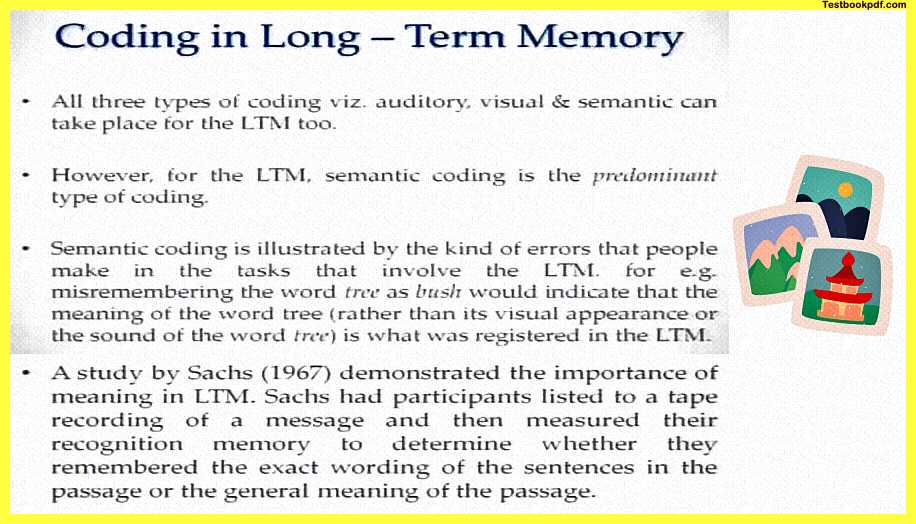
Now coming to long-term memory and the brain there have been neuropsychological studies about investigating things in the brain the method of dissociation has been used in memory research to differentiate between short-term memory and long-term memory by studying people with brain damage that has affected one of these functions by sparing and sparing the other so there could be patients whose short-term memory is impaired but long-term is intact there might be patients whose long-term memory is intact but short-term memory is impaired so the there was a very famous patient called henry Molizon and Glenn Humphries was a very famous psychologist who worked with him all his life.
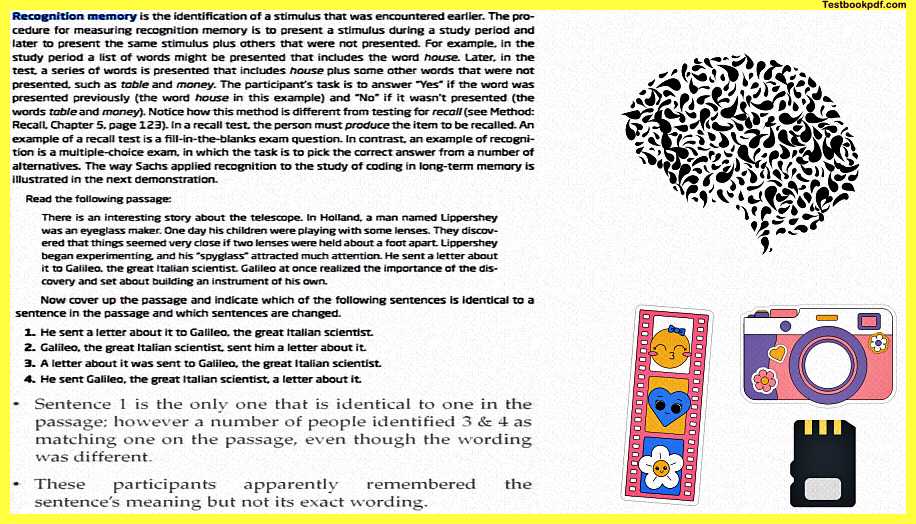
Now basically henry Molizo has been referred to as ever since so basically was having seizures and what happened was that he was having these epileptic seizures and the doctors of that era basically eliminated part of his temporal frontal temporal lobes wherein the memory was supposed to be there so that operation that was basically meant to eliminate his seizure also, unfortunately, eliminated his ability to form new memories.
Long-Term Memory
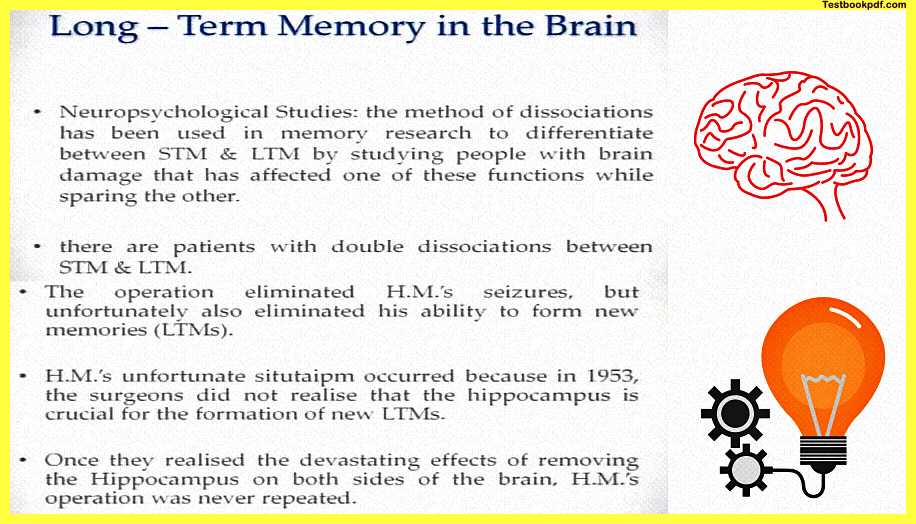
Now H.M unfortunate situation occurred because in 1953 the surgeons did not realize that the hippocampus is crucial the hippocampus got removed so the hippocampus is crucial for the formation of new long-term memories once they realize the devastating effects of removing the hippo cam campus on both sides of his brain hm’s operation was never repeated on any other patient ever here is a picture of henry Molaison he died recently I think a few years ago while still being a subject of one of the studies he a lot of memory research has been done with the help of aj another way in which long-term memory has been studied is by using methods of neuroimaging some brain imaging experiments have demonstrated the activation of different areas of the brain for short-term memory tasks versus long-term memory tasks.
for example, de Bortoli and colleagues measured the fMRI response to a task involving short-term memory and long-term memory he first presented a list of words to participants but instead of asking the participants to recall the words they presented a single probe word so they are looking for recognition test the probe was either a word from near the beginning of the list or a word at the end of the list or a word that had not been presented earlier at all the participant’s task was to indicate whether the word has been presented before so a very simple task based on recognition memory.
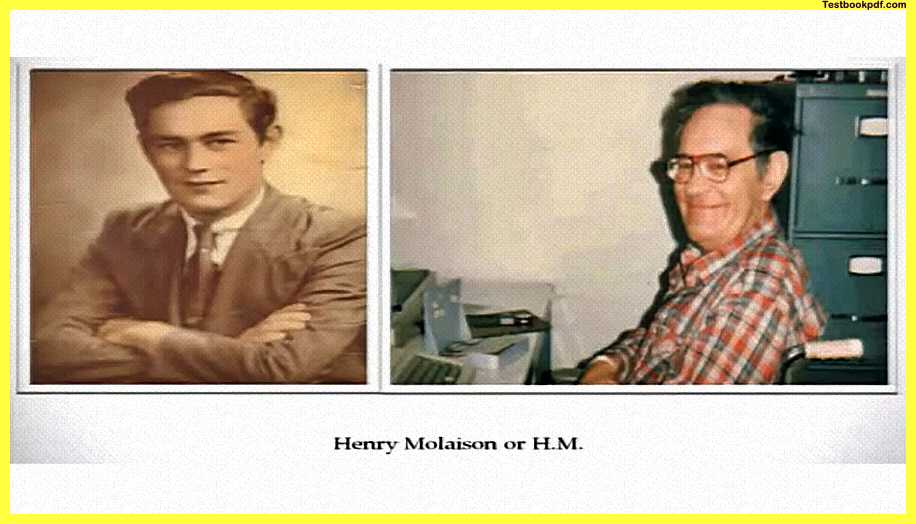
Now their brain activity was measured with fMRI after the probe was presented and as the participants were preparing to respond the results indicated whatever they found out with respect to brain activations indicated that the pro words that were from the beginning of the list activated areas of the brain associated with long-term memory and short-term memory because words at the beginning of the list would be in the long-term memory and would then be transferred to the short-term memory because they are being recalled in contrast the words.
at the end of the list only activated the areas from relevant to the short-term memory because these words have not already got to the long-term memory although Talmy’s experiment demonstrates very well the activation of different areas for short-term and long-term memory the results of many other experiments have not been really as clear cut.
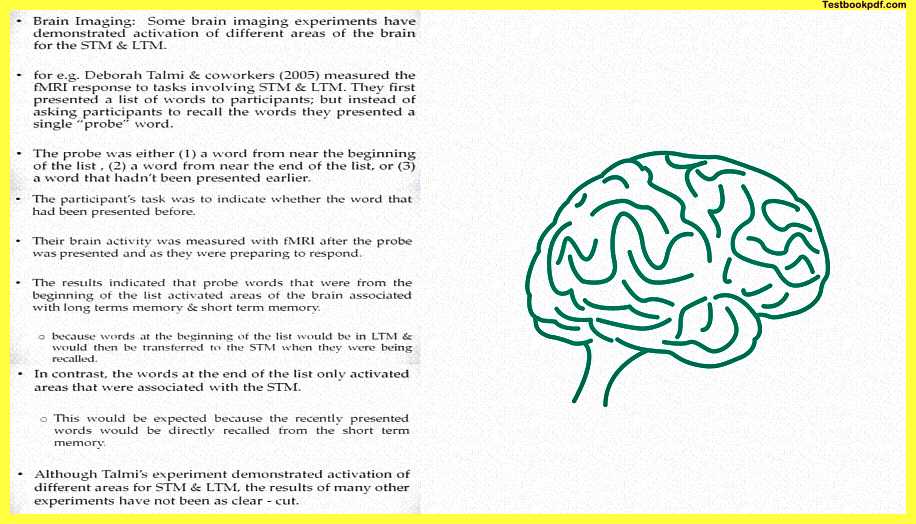
Now you can probably think that this might be the case because short-term and long-term memories might not be as disconnected from each other as a theoretical model would make it to be this is all about long-term memory and I hope you kind of followed what long-term memory is about and how it is important in the next article we will start talking about some other aspects of memory thank you.
Read also:
Memory Psychology Pdf Download (Part-1)
